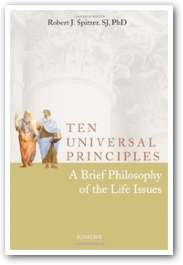Order Ten Universal Principles by Father Robert Spitzer, S.J. here
Introduction
This assertion is not made arbitrarily or out of a so-called slippery slope argument, for history is so replete with examples of these failures and their consequences that it would be wholly unreasonable and irresponsible not to infer its validity. We have all heard the cliché attributed to Einstein, that “insanity is doing the same thing over and over and expecting different results.” Our objective then in presenting this curriculum is first and foremost to prevent great harm to individuals and communities, and thereby to prevent this kind of “insanity” from repeating itself in our national and even international history. The evolution of culture and civilization has arisen out of the development of ten fundamental principles. Three of them concern evidence and objective truth, three of them concern ethics, three of them concern the dignity and treatment of human beings within civil society, and one of them concerns personal identity and culture. Failure to teach and practice any one of these principles can lead to an underestimation of human dignity, a decline in culture, the abuse of individuals and even groups of individuals, and an underestimation of ourselves and our potential in life. Failure to teach and practice several of these principles will most certainly lead to widespread abuse and a general decline in culture.
A brief review of these principles will give further credence to our claim that they are an essential safeguard of human dignity, welfare, and community. Some may say that it is the legal system or democracy or the courts that are the real protectors of individuals, culture, and society; but as will become evident, without the ten principles, democracy could vote out the rights of human beings, court systems could legalize every form of indignity and harm, and legal systems would have nothing upon which to base their laws. Again, one does not have to look very far to see these abuses in world history with its kangaroo courts, arbitrary marginalization and persecution of peoples, and justification of slavery, discrimination, and maltreatment. Systems and courts are mere structures. They are designed to operationalize something beyond themselves. That “something”, we would maintain, is the fruit – the best fruit of the human spirit that we believe to be enshrined in these ten principles. …
Read more here: https://www.catholiceducation.org/en/religion-and-philosophy/philosophy/introduction-amp-principles-of-ethics.html







